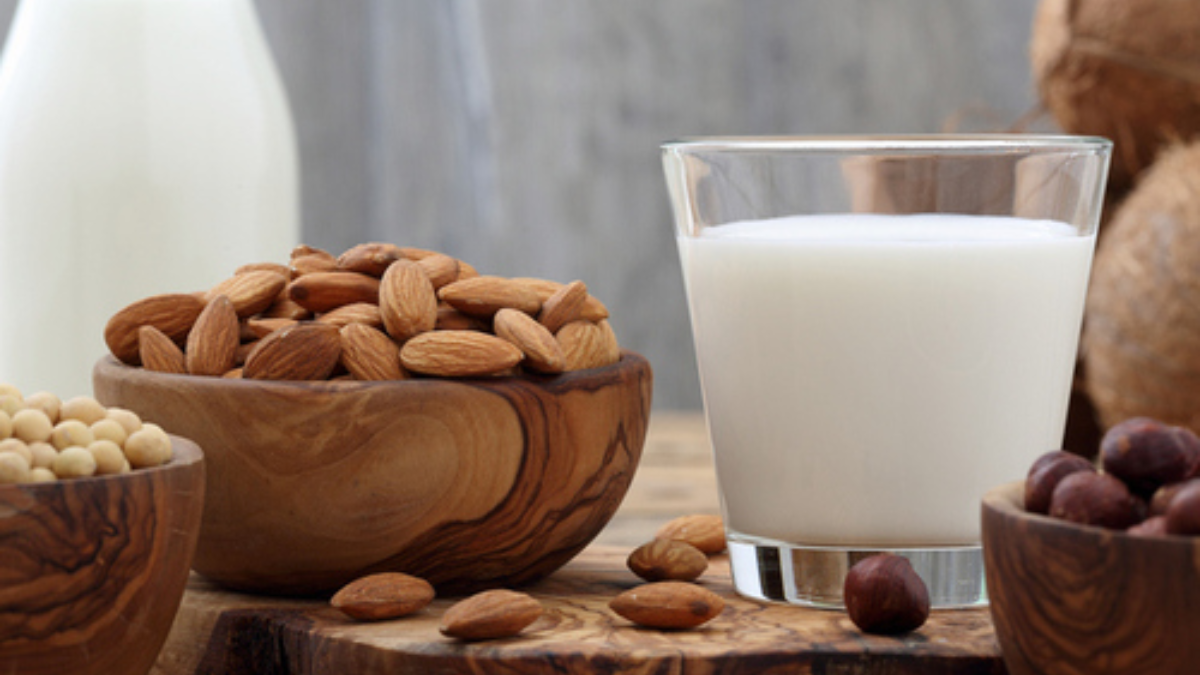You’re not alone if you’re confused by the nutrition facts for coconut milk vs. almond milk. A recent study found that lowering the amount of saturated fat a person eats daily decreased the risk of heart disease and stroke by 21 percent. However, coconut milk has virtually no protein, making it less than ideal for kids. If you’re unsure which milk is better for your body, You have come to the right place.
Coconut milk does not have nearly as much protein as dairy milk in terms of nutrients, and coconut milk has eight times as much protein as all varieties of genuine milk. Many coconut milk products, thankfully, do include some calcium and vitamin D. Overall, coconut milk has fewer nutrients than dairy milk, though the level of the fortification varies from brand to brand. If you’re confused about whether milk is better for your health, it’s crucial to choose real dairy milk.
Nutrition Facts Comparision (Almond & Coconut Milk)
There are more differences between coconut milk and almond milk than initially meets the eye, despite the appearance of apparent differences. Almond milk and coconut milk have quite different nutritional profiles. The nutritional content of one cup of each food is listed below.
Coconut Milk
- Calories – 76
- Fat –5g
- Saturated fats – 5g
- Protein – 0.5g
- Carbohydrates – 7g
Almond Milk
- Calories – 37
- Fat –2g
- Saturated fats – 0.2g
- Protein – 1g
- Carbohydrates – 3g
Comparison
- Coconut milk contains more calories per 76 grams, while almond milk contains only 37 grams. Both coconut milk has 5grams, and almond milk has 2grams of fat. Both kinds of milk contain small amounts of fat, but they’re less than equal when it comes to protein. Both have healthy fats, but coconut milk is much higher in saturated fat than almond milk.
- Almond milk contains healthy fatty acids, including monounsaturated fats, which have been proven to reduce cholesterol and belly fat. Almond milk also contains vitamin E, which helps prevent free radical damage to our cells. Fortified almond milk can also help you lose weight, as it contains 50 percent more calcium than dairy milk. Despite its low-fat content, coconut milk contains a higher level of potassium than almond milk.
- Coconut milk is the most widely available, and almond milk has become the most popular non-dairy milk. Many coffee shops have even started offering them as an alternative to regular milk. Whether you prefer almond or coconut milk is a matter of personal preference and your health goals. Thankfully, there are a lot of benefits to either type of milk. Just remember to check the nutrition facts and choose wisely!
- Coconut milk is slightly sweeter than almond milk and has a nutty flavor and graininess, while almond milk has a slightly fruity taste. Coconut milk is made by soaking the powdered coconut flesh in water.
Who should Try Almond or Coconut Milk?
For a variety of reasons, almond milk, coconut milk, and other plant-based choices are acceptable. These plant-derived substitutes work well in cereal, oatmeal, smoothies, coffee, and baked goods if you have lactose intolerance or allergy to cow’s milk without having any negative effects.
These types of milk can also assist you in lowering your intake of animal products, which is something many people are attempting to achieve. In actuality, substitute milk is occasionally consumed by dairy drinkers as well. According to a survey by the International Food Information Council (IFIC), one-fourth of milk drinkers occasionally choose a plant-based substitute. Since soy milk, oat milk, or hemp milk are better options for people with nut allergies, coconut milk and almond milk are also categorized as nut milk.
Coconut Milk
Here is the information about coconut milk:
How it’s Made
The coconut milk sold in cans and the milk sold in cartons differ from one another. The former is a higher-fat, thicker blend that is more frequently used for cooking and is created from grated and pressed coconut meat. The latter is more consistent with low-fat milky because it has been diluted with water.
Not every container of coconut and water makes up coconut milk, and gums, utilized as thickeners, vitamins, and minerals, may also be included. Aside from carrageenan, which has been linked to intestinal irritation, most thickening agents are safe.
Coconut milk is one of many plant-based milk varieties that have been sweetened with additional sugar.
However, since adults typically take 17 teaspoons of added sugar each day, it is preferable to drink unsweetened coconut milk. For context, the American Heart Association (AHA) advises men and women to consume no more than nine teaspoons of added sugar per day.
It’s best to look for a kind that has been fortified to match dairy milk’s calcium and vitamin D content, even if the nutrients added to boost coconut milk can vary from brand to brand.
Choosing one that is fortified with vitamin B12, a vital vitamin that is only present naturally in animal diets, may also be a good idea if you’re a vegan or vegetarian.
Benefits of Coconut Milk
Here are the health benefits of coconut milk:
- Because it contains medium-chain triglycerides, coconut milk stands out (MCTs). This kind of fat is noteworthy since it might boost your metabolism and help you lose body fat. (MCT oil may also have other advantages.)
- Regarding the advantages of MCTs in coconut milk, the data is not conclusive, and MCTs are frequently used in supplement form in studies.
- Since coconut milk has been diluted with water, it doesn’t provide these fats the same amount. Therefore, it’s hard to say whether you’ll benefit in the same way from MCTs found naturally in coconut milk.
- According to a study from 2020 that was published in the International Journal of Food Science, it contains phenol chemicals. Although obtaining them from coconut milk hasn’t been researched in people, in theory, these antioxidants guard against the oxidative stress linked to the onset of cancer, heart disease, and other illnesses.
- Your best bet for protecting your health is to eat primarily whole or minimally processed fruits and vegetables and other plant foods (such as nuts and whole grains).
- Coconut milk can certainly be an addition to this eating pattern, but it shouldn’t be considered a sole source of antioxidants.
Coconut Milk Concerns
Here are some health concerns of coconut milk:
- Coconut milk’s high saturated fat content is mostly negative. That particular type of fat has been associated with an increased risk of heart disease.
- Although there is much misunderstanding regarding saturated fat, the AHA advises keeping it to a maximum of 13 grams per day for a 2,000-calorie diet. As a result, your consumption of saturated fat should decrease if you consume less calories.
- The American Heart Association advises keeping saturated fat intake to no more than 6% of total calories. A 2020 Cochrane Review of 15 research involving more than 59,000 individuals discovered that reducing saturated fat intake resulted in a 21% decreased risk of cardiovascular disease.
- In other words, cutting your saturated fat intake could reduce your chances of a heart attack or stroke.
-
Also, while ordinary milk has eight grams of protein per cup, coconut milk has almost none. This may not be an issue if you’re consuming it with other protein sources or careful about making up the protein deficit.
Almond Milk
Here is the information about almond milk:
How it’s Made
The ingredients for almond milk are pulverized almonds that have been soaked and filtered to remove the particles. Water is also used to dilute it.
Almond milk is then improved, like coconut milk, with various gums thickening and stabilizing it. Almond milk is frequently sweetened with sugar and may be supplemented with vitamins D and E, calcium, and other elements.
Benefits of Almond Milk
Here are the health benefits of almond milk:
- A review in the Journal of Food Science Technology said that since almonds contain prebiotic fiber, almond milk also contains this fiber.
- Prebiotic fiber is a type of fiber that feeds your healthy gut bacteria and promotes their growth (not to be confused with probiotics).
- However, don’t rely on almond milk to satisfy your demand for fiber. Overall, it isn’t a very effective fiber source. Whether or not you drink almond milk, aim to consume 25 to 38 grams of fiber daily by selecting a range of fiber-rich plant foods.
- If you’re attempting to reduce or maintain your weight, almond milk can be beneficial because it is low in calories, fat, and carbohydrate and has less saturated fat. Monounsaturated fat, also present in olive oil, makes up most of the fat in almond milk.
- Numerous studies suggest that this kind of fat may aid with weight loss, weight management, and lowering levels of dangerous LDL cholesterol. Almond milk by itself won’t provide these advantages, of course. However, it can be incorporated into a diet that supports a healthy weight and heart.
Almond Milk Concerns
Here are some health concerns of almond milk:
- Protein, manganese, magnesium, copper, and other minerals and bioactive compounds are all found in abundance in almonds, which are also exceptionally nutrient-dense. Nevertheless, almond milk has relatively modest levels of these substances because it is diluted and includes few almonds.
- But if you eat almonds and other foods that contain them, you don’t need to worry about getting these nutrients from almond milk.
- Almond milk is low in protein and is not advised for young children, much like coconut milk. Almond milk may also contain a lot of added sugars, which have been linked to a variety of health issues, including memory loss and visual abnormalities as well as heart disease, high blood pressure, and other conditions.
- Similarly to coconut milk, you might wish to avoid any products that list carrageenan among their ingredients.
Which is Better?
Coconut and almond milk are both suitable choices if you’re looking for plant-based milk due to lactose intolerance, a milk allergy, or concerns for animal welfare. Almond milk, however, comes out on top if you search for the one with the fewest calories and the best fat composition.
Any milk you choose should always be unsweetened and supplemented with calcium and vitamin D at comparable levels in cow’s milk. Additionally, since neither milk contains a significant amount, ensure you take adequate protein from other sources.
Conclusion
Both almond and coconut milk are prepared differently. You should consider yourself and try the thing that is healthy for you and your health because it is on you that is suitable for you.
Several nuts, particularly almonds, are used to make almond milk. Almond milk is a natural milk source, however, it doesn’t include any nitrates, phosphorus, or cholesterol. Both are excellent vitamin E sources. Almond milk is thinner than coconut milk, though. To thin out coconut milk, it must undergo two straining stages. However, healthful fats are present in both types of milk. Whichever you choose will rely on your preferences, regardless of which is healthier


